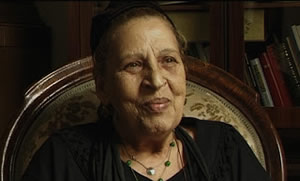De Amerikaanse dichter Madison Julius Cawein werd geboren in Louisville, Kentucky, op 23 maart 1865. Zie ook alle tags voor Madison Cawein op dit blog.
A Boy’s Heart
It’s out and away at break of day,
To frolic and run in the sun-sweet hay:
It’s up and out with a laugh and shout
Let the old world know that a boy’s about.
It’s ho for the creek that the minnows streak,
That the sunbeams dapple, the cattle seek;
For a fishing-pole and a swimming-hole,
Where a boy can loaf and chat with his soul.
It’s oh to lie and look at the sky
Through the roof of the leaves that’s built so high:
Where all day long the birds make song,
And everything ’s right and nothing is wrong.
It’s hey to win where the breeze blows thin,
And watch the twinkle of feather and fin:
To lie all day and dream away
The long, long hours as a boy’s heart may.
It’s oh to talk with the trees and walk
With the winds that whisper to flower and stalk:
And it’s oh to look in the open book
Of your own boy-dreams in some leafy nook.
Away from the noise of the town, and toys,
To dream the dreams that are dreamed by boys:
To run in the heat, with sun-tanned feet,
To the music of youth in your heart’s young beat.
To splash and wade in the light and shade
Of the league-long ripples the sunbeams braid:
In boyhood’s wise to see with eyes
Of fancy hued as the butterflies.
To walk for hours and learn the flowers,
And things that haunt the woods and bowers:
To climb to a nest on a tree’s top crest,
Where a bird, like your heart, is singing its best.
To feel the rain on your face again,
Like the thirsty throats that the flowers strain:
To hear the call of the waterfall,
Like the voice of youth, a wonder-thrall.
And it’s oh for me at last to see
The rainbow’s end by the hillside tree:
On the wet hillside where the wild ferns hide,
Like a boy’s bright soul to see it glide.
Then to laugh and run through shower and sun
In the irised hues that are arched and spun:
And, the rainbow’s friend, to find and spend
The bag of gold at the rainbow’s end.
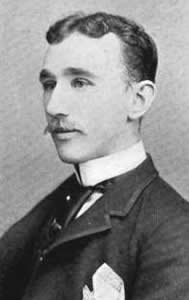
Rond 1893
De Zwitserse schrijfster Federica de Cesco werd geboren op 23 maart 1938 in Pordenone, Zie alle tags voor Federica de Cesco op dit blog.
Uit: Die Augen des Schmetterlings
“Mein Verstand sagt mir, dass etwas, das nicht mehr da ist, auch nicht mehr zurückkommen sollte; aber ganz sicher werde ich nie sein. Ich bin eine Frau, die auf Vorzeichen achtet, die in Mondnächten mit griffbereitem Messer durchs Haus geht. Alle schlafen in diesem Haus, warm und ruhig und im Vertrauen. Ich trete leise auf, ganz leise. Die Schlafenden sollen nicht gestört werden. Es liegt etwas Beruhigendes in dem sicheren Gefühl des Messers in meiner Hand, in dem Funkeln der kurzen, scharfen Klinge. Behutsam ziehe ich die Schiebetür auf, beobachte die Bewegung der Blätter, den Nebelflor, das zarte Gespinst. Unter dem Mondlicht wandeln sich die Dinge, verändern ihr Gesicht. Ich blicke nach allen Seiten, nach drei, vier Seiten, nach allen Seiten, nach drei, vier Seiten. Immer wieder und wieder. Kurz vor der Morgendämmerung kommt Wind auf, ein salziger Wind, der vom Meer her weht. Trägt er den Blumenduft des Todes heran, schließen sich meine Finger fester um den Griff. Mein Gesicht, meine Hände glänzen hell. Ich stehe ja nicht im Schatten, ich will gesehen werden. Ein leichtes Zittern geht über meine Haut, aber Furcht empfinde ich keine. Ich bin eine Sonnentochter; der Geist, der in der Dunkelheit schwebt, entstammt dem bleichen Mondgeschlecht. Ich sage: »Weg mit dir! Was glaubst du, wer ich bin?« Bewegen sich Blätter, knistern Zweige, zieht meine Klinge einen blitzenden Kreis. Aufrecht stehe ich vor der Schiebetür, spreche halblaut die richtigen Worte. Die Menschen, die ich liebe, sind in Sicherheit. Weil Enzo nicht mehr da ist, bin ich es von nun an, die Wache hält.
Ich betrachte mich oft im Spiegel, nicht aus Eitelkeit, sondern aus Neugierde. Meine Vorfahren waren Samen, jenes Volk im Hohen Norden, das noch vor hundert Jahren in »Lavvo« – in Stangenzelten – lebte. Ich trage ihr Erbe in mir; es prägt meine äußere Erscheinung. In meinem Gesicht erkenne ich Lailas Augen, die ohne zu blinzeln das Sonnenlicht ertragen; ich sehe Reidars harte Wangen, sein starkes Kinn. Und auch Henriks dunkles Haar, die etwas stumpfe Nase, den sinnlichen Mund. Ich beschreibe mich wie die Bilder, die ich oft auf den Zeitschriftenseiten sah: grüne Augen, fein geformte Züge, über die das Licht rinnt wie Wasser, eine auffallend gewölbte Stirn. Doch womöglich trägt mein Gesicht noch andere, geheimnisvollere Spuren? Ich weiß es, ich habe sie gesehen.”
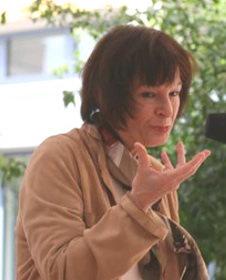
De Franse schrijver Roger Martin du Gard werd geboren op 23 maart 1881 in Neuilly. Zie alle tags voor Roger Martin du Gard op dit blog.
Uit: Les Thibault, I, Le pénitencier
“Arthur attendait dans lacour. Jacqueseût voulu prendrecongé du directeur; mais M.Faîsme lui tournait le dos: il pous-sait lui-même, ainsi que chaque soir, les verrous du portail. Au milieu des aboiements du chien, Jacques entendit la voix d’Arthur:
–«Eh bien, vous venez?»
Il le suivit.
Il retrouva sa cellule avec une impression de soulagement. La chaise d’Antoine était là, près de la table. L’affection du frère aîné l’enveloppait encore. Il endossa ses vêtements de travail. Le corps était las, mais le cerveau alerte; il y avait en lui, outre le Jacques de tous les jours, un autre être,immatériel, né d’aujourd’hui, qui regardait agir le premier, qui le dominait.
Il ne put demeurer assis, et se mit à tourner en rond dans la chambre. Un sentiment neuf et puissant le tenait debout: la conscience d’uneforce. Il s’était approché de la porte, et il restait là, le front au carreau, l’œil fixé sur la lampe du couloir désert. L’atmosphère suffocante ducalorifère augmentait sa fatigue. Il dormait presque. Tout à coup, de l’autre côté de la vitre, une ombre se dressa. La porte, fermée à double tour, s’ouvrit:
Arthur apportait le dîner.
–«Allons, dépêche, petite crapule!»
Avant d’entamer les lentilles, Jacques retira du plateau le morceau de gruyère et le gobelet d’eau rougie.
–«Pour moi?» dit le garçon. Il sourit, prit le bout de fromage et s’en fut le manger près de l’armoire, afin de n’être pas vu de la porte. C’était l’heure où, avant son dîner, M.Faîsme venait, en pantoufles, faire un tour dans le couloir; et le plus souvent on ne s’apercevait de sa visite qu’après son passage, à l’odeur écœurante du cigare qui pénétrait par le treillage de l’imposte.”
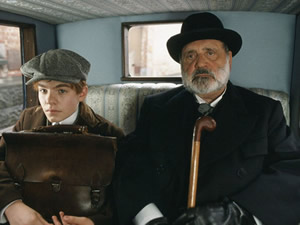
Scene uit de film “Les Thibaut” van Jean-Daniel Verhaeghe, 2003
De Hongaarse schrijver Hamvas Béla werd geboren op 23 maart 1897 in Eperjes (tegenwoordig Prešov). Zie alle tags voor Hamvas Béla op dit blog.
Uit: Preface to Crime and Punishment (Vertaald door Bors Hulesch)
“Theodor Dreiser, over half a century after Dostoevsky, wrote An American Tragedy. This novel poses exactly the same question: is it permissible to kill in order to get ahead? Dreiser’s conclusion is that, as a result of an unjust social structure, it is not man who is responsible for murder, but society itself. This stereotypical cliché helped to diminish the poignancy of the matter at the time, and it should sound all the more familiar to the contemporary ear because has is also become part of our school curriculum.
Before the murder, Rodion Raskolnikov was undoubtedly a Stendhalian hero in the likeness of Julien Sorel, or perhaps one of Balzac’s characters; a contemporary careerist who, in the name of his accomplishment, was ready to commit Napoleon-like misdeeds. After committing the murder though, this picture changes. Raskolnikov would now shrug his shoulders at Dreiser’s theorem and tell us that he was also going to save himself from his predicament by some similar reasoning; but that all of this remained on a theoretical level and was left behind when he actually struck the old woman down. As to what becomes of him? He is now like a dog about to attack, baring his teeth to growl the words: Dear Mr. Society, please do step closer – not to worry – and have a look at these. What are these, sir? (Shows his hands.) Do you know what these are? I will tell you sir, they are hands. They are my two hands. I killed her with this pair of hands.These hands you shall not remove from me, sir. You suggest that social structure is wrong, sir, and that consequently, I was forced to murder this usurer. That society is to blame. That the unjust distribution of wealth is… – blah-blah, we know all the rest. Look, sir, if I could only undo what I have done, I would chop these two hands right off. But I cannot. I have indeed killed her, and all I can do now is accept the responsibility and go do my time in Siberia. Twenty years? Let it be twenty years. But I forbid you to spread any rumors about me wanting to divert the blame onto the inequalities of social structure. Injustice exists independently of my affair, and although it may have a bearing, however remote and slight, on the events; this can only be theoretical.”
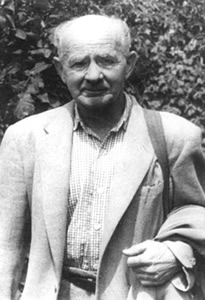
De Franse dichter en schrijver Daniel Biga werd geboren op 23 maart 1940 in Nice. Zie alle tags voor Daniel Biga op dit blog.
FOUILLES
Ma direction est le poids du silence
épousant le vacarme du temps
révèle le signe dans l’insignifiant
creuse dans le tronc la souche la racine
vise précisément
puis le travail accompli lève-toi
et d’un seul regard embrasse
la vastitude
ceci est le mouvement juste
Les Salopards
“Sois un
Soleil!”
mais comment ne pas être parfois cet astre noir qui
les carboniserait ceux-là tous ceux-là parvenus traîtres collabos
notables profiteurs affairistes…
ils ont démoli
Pauliani!
le cinéma le patronage les jardins la ruelle le passage
et l’école après avoir embétonné dans la cité le cours du
Paillon ils ont démoli
Pauliani comme le reste : je découvre cette nouvelle plaie errant ce
matin dans le quartier où depuis si longtemps je n’étais
revenu et d’immenses panneaux annoncent que vont s’édifier
là les luxueuses résidences d’Acropolis
les salopards!
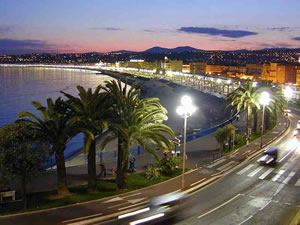
Nice, Promenade des Anglais
De Oostenrijkse schrijfster Ceija Stojka werd op 23 maart 1933 geboren in Kraubarth. Zie alle tags voor Ceija Stojka op dit blog.
Uit: Träume ich, dass ich lebe?
“Das haben wir ausgenutzt. Wir sind ins Haus, haben uns gewaschen und geputzt, haben die Kleider gewechselt, haben die Post genommen und sind halt einmal zu Hause gewesen. Aber bald mussten wir wieder weg. Die Mama hat immer gesagt, lieber einen Tag länger auf eurem Platz, bevor sie uns finden! Wenn der Park sauber gemacht wurde, mussten wir uns woanders verstecken, unter der Brücke, oder wir haben uns aufgeteilt.
Aber wir haben auch gelacht, der Karli und die Kathi, die Mitzi und der Mongo, die haben oft kleine Vorstellungen gegeben. Der Karli hat gespielt, er ist der gestiefelte Kater.
Er hat hinten auf seine Schuhe diese Tortenschneider befestigt, die hatten einen Stiel und ein Radl mit kleinen Zacken. Er war der gestiefelte Kater und er war so schön, sein Gesicht hat gebrannt wie Feuer. Wir haben furchtbar gelacht. Aber wenn wir in den Laubhaufen gekrochen sind, durften wir nicht lachen.
Meine Mutter hat immer auf die Schritte der Leute draußen gehorcht, sie hatte schon die Unterschiede herausgefunden. Die Spaziergänger hat man schon von weitem langsam kommen gehört, sie haben gesagt, na bald kommt der Frühling. Dann hast du gewusst, es ist ein Liebespärchen. Aber die Nazis sind immer gerannt und haben geschimpft.
Wir haben nur gespürt, dass sie ganz schlimme Menschen sind. Ich hab einige Male auf der Straße erlebt, dass sie Kinder getreten haben. Da wird man dann lautlos. Und nachdem ich miterlebt hatte, wie sie meinen Vater holten, war schon klar, dass das nicht okay sein kann.”
